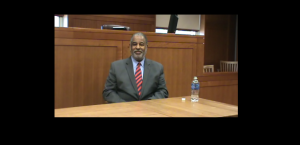By: Chandler Reece
Since ancient times, people have recognized the need for judges to be impartial.[1] On a related topic, Alexander Hamilton wrote that the “complete independence of the courts of justice is peculiarly essential in a limited constitution.”[2] Two recent North Carolina cases have revealed areas for reform to further ensure impartiality in the North Carolina judicial system.
Lake v. State Health Plan for Teachers and State Employees[3] concerns a class action lawsuit by retired state employees challenging reforms to state health care laws.[4] On appeal, five justices on the North Carolina Supreme Court disclosed that close family members or their estates could be class members and, therefore, interested in the suit.[5] The North Carolina Supreme Court is composed of seven justices, and four of them are needed to constitute a quorum.[6] The quorum requirement would mandate a dismissal if all of these justices recused.[7] The court invoked the common law rule of necessity to hear the case despite the ethical rules otherwise mandating their recusal.[8]
North Carolina State Conference of the National Association for the Advancement of Colored People v. Moore[9] concerns litigation challenging two 2018 North Carolina constitutional amendments on the grounds that the amendments were invalid ab initio because members of the General Assembly were elected from racially gerrymandered districts.[10] When the case went to the North Carolina Supreme Court, the NAACP moved to have two justices, Phil Berger, Jr. and Tamara Barringer, disqualified from the case.[11] The plaintiff argued that Justice Barringer needed to recuse herself because she voted for the amendments.[12] It also argued that Justice Berger needed to recuse because he is the son of Senate President Pro Tempore, Phil Berger, who voted in favor of the amendments and is a defendant.[13] Justices Berger and Barringer declined to recuse themselves in separate orders.[14]
North Carolina does not have a system where alternates can fill in for a recused or disqualified justice or statutes creating a panel to hear a case where a quorum is not available.[15] The state does have a statute that allows for an alternate justice to serve whenever a justice is determined to be incapacitated.[16]
Lake and Moore reveal the flaws in ethical rules where justices cannot elect to have alternatives chosen. Given that ethics are involved, there are no easy answers to these questions. For instance, one justice may decide that the North Carolina Code of Judicial Conduct requires that she recuse herself because her participation may create too much of a risk of the public thinking that judges will unscrupulously decide cases based on pecuniary, familial, or partisan interest.[17] Another justice may decide to hear the case notwithstanding these concerns over public reception because of a recusal’s potential to act as a de facto vote against the petitioner.[18] Rather than forcing justices into these precarious dilemmas, some variation of the following reforms should be adopted in North Carolina.
The first proposal for reform is to have a standing panel of alternative justices ready to hear cases where too many justices are disqualified and a quorum is not possible.[19] The second is to authorize the summoning of a number of retired judges from that panel or a predetermined list that reflects the partisan makeup of the court to hear a case wherein the justices are disqualified from participating but a quorum would still be present.[20]
Two other potential reforms exist, but an issue with them illustrates what the proposed reforms should account for. One of them would be to allow the North Carolina Supreme Court to certify to the governor that all or some of its justices are disqualified, after which the governor would commission the requisite number of justices.[21] Another would be to allow the North Carolina Supreme Court to summon retired or currently serving trial or appellate judges to serve on the court.[22] The issue with either of these reforms is that whoever chooses these ad hoc alternate justices would have an incentive to pick people likely to rule the way they want because they would know about the case causing the conflict of interest.[23] Due to this problem with ad hoc appointments, recusal reforms should focus on commissioning a panel or list of retired judges to be on call whenever cases like Lake arise—where too many justices are disqualified from participating, but the panel should be constituted before any of those cases arise.
Composing this panel of retired judges and justices would be more desirable than composing it of practicing attorneys or legal scholars because former judges will have experience in deciding cases on legal, as well as factual bases.[24] Still, a panel of scholars or practicing attorneys might be more desirous because conflicts of interest affecting all judges—like laws regarding judicial salaries and retirement benefits—might not affect them.[25] Perhaps the legislature could get the advantages of both approaches by having two panels or lists, one consisting of retired judges and another consisting of practicing attorneys and legal scholars, and the circumstances would dictate from which panel or list to draw the alternates. The nuances involved in balancing these benefits and other questions—like who chooses the members of the panel or list—should be weighed by the state legislature in choosing which approach to take, but it should choose a system where the alternate justices are chosen before any cases arise.
Regarding cases like Moore where there would be a quorum despite the potential recusals, a statute should still be enacted to authorize the summoning of justices from a standing panel or predetermined list. Without such a provision, justices might justify their decision not to recuse, despite a valid reason to do so, because they fear their recusal would be a de facto vote to affirm the lower court’s decision.[26] This panel or list should be representative of the current partisan makeup of the court to prevent the following issue that can motivate a justice not to recuse.[27] Without such a provision, the justice might fear that their recusal might cause the partisan makeup of the justices hearing the case to be too biased in favor of either party.[28] The current partisan constitution of the North Carolina Supreme Court and how Moore implicated partisanship illustrate this point.
Four justices on the North Carolina Supreme Court are Democrats and three of them are Republicans.[29] Justices Berger and Barringer are two of the Republicans.[30] Even though Berger and Barringer did not raise the following concern in their motions to deny recusal,[31] justices in this position would be justified in thinking that at least one of the Democratic justices could be convinced to vote with the Republican ones.[32] If one of these justices were so convinced, then the outcome of the case would be dictated by the justices’ recusal.[33]
Even though the two proposed reforms would not affect the outcomes of Lake or Moore, these two cases illustrate the need for them because the current incentive structure is for justices not to recuse even where they are mandated by law or where one could argue they should as an ethical matter. Rather than force justices into these ethical dilemmas, the legislature should, as argued above, create a panel system of alternative justices to serve when a quorum would otherwise be denied and allow for members of that panel or members of a list of alternative justices to fill in for a disqualified or recused justice.
[1] See Exodus 23:8 (“Neither shalt thou take bribes, which even blind the wise, and pervert the words of the just”); Code Just. 3.5.1 (Valens, Gratian, and Valentinian 376) (Fred H. Blume trans., n.d.), http://www.uwyo.edu/lawlib/blume-justinian/_files/docs/Book-3PDF/Book%203-5.pdf (stating judges cannot decide their own cases).
[2] The Federalist No. 78, at 429 (Alexander Hamilton) (George Stade ed., 2006).
[3] 861 S.E.2d 335 (N.C. 2021).
[4] See generally Lake v. State Health Plan for Tchrs. & State Emps. (Lake I), 12–CVS–1547, slip op. (N.C. Super. Ct. Oct. 11, 2016), https://lakeclasscase.com/wp-content/uploads/2016/09/59.Order-Granting-Motion-for-Class-Certification.2016-10-11.pdf (class certification); Lake v. State Health Plan for Tchrs. & State Emps. (Lake II), 825 S.E.2d 645, 648–49 (N.C. App. 2019) (other factual and procedural history).
[5] Lake v. State Health Plan for Tchrs. & State Emps. (Lake III), 852 S.E.2d 888, 889–90 (N.C. 2021); see also N.C. Code of Jud. Conduct Canon 3C(d)(iii) (stating that judges are disqualified from participating in a case where a family member “within the third degree of relationship” to the judge or his spouse has an “interest that could be substantially affected by the outcome of the proceeding).
[6] N.C. Gen. Stat. § 7A-10(a).
[7] Lake III, 852 S.E.2d 888, 890 (N.C. 2021).
[8] Lake v. State Health Plan for Tchrs. & State Emps. (Lake IV), 861 S.E.2d 335, 336 (N.C. 2021). Under the rule of necessity, a judge must hear a case if “disqualification would result in the lack of any competent court or tribunal.” Rule of Necessity, Black’s Law Dictionary (11th ed. 2019). Nothing in this article is intended to suggest that invoking the rule of necessity in Lake was unethical or immoral in itself, only that the situation as a whole illustrates the need for reform.
[9] 849 S.E.2d 87 (N.C. App. 2020).
[10] N.C. State Conf. of the NAACP v. Moore, 849 S.E.2d 87, 89 (N.C. App. 2020).
[11] Motion to Disqualify Justice Barringer and Justice Berger, N.C. Conf. of the NAACP v. Moore, No. 261A18–3 (N.C. Jul. 23, 2021).
[12] Id. at 5.
[13] Id. at 2. (citations omitted). In fairness to Justice Berger, Senator Berger was being sued in his official and not his personal capacity, Moore, 849 S.E.2d at 87 (caption), and suits against an official in her official capacity are suits against the government or her office itself, Estate of Long v. Fowler, 861 S.E.2d 686, 691 (N.C. 2021) (the state); Will v. Mich. Dep’t of State Police, 491 U.S. 58, 71 (1989) (the official’s office or “the state itself”).
[14] N.C. State Conf. of the NAACP v. Moore, No. 261A18–3, 2022 N.C. LEXIS 18, at *6 (N.C. Jan. 7, 2022) (Berger, J.); N.C. State Conf. of the NAACP v. Moore, No. 261A18–3, 2022 N.C. LEXIS 17, at *4 (N.C. Jan. 7, 2022) (Barringer, J.). As noted above with Lake, nothing in this post is intended to argue that the decisions not to recuse are unethical or immoral in themselves, only that they illustrate opportunities for reform.
[15] See N.C. Gen. Stat. § 7A-4; § 7A-5.
[16] N.C. Gen. Stat. § 7A-39.5(a).
[17] See N.C. Code of Jud. Conduct Canon 2A (stating judges should act “in a manner that promotes public confidence in the integrity and impartiality of the judiciary”); id. Canon 3C(1) (noting that a judge should disqualify herself “in a proceeding in which the judge’s impartiality may reasonably be questioned”); In re Stone, 838 S.E.2d 165, 171 (N.C. 2020) (citing In re Edens, 226 S.E.2d 5 (1976)) (describing that whether conduct is judicial misconduct depends on what an “objective observer” would deem conduct harming “the public esteem for the judicial office”).
[18] See Cheney v. U.S. Dist. Ct. for the Dist. of Columbia, 541 U.S. 913, 916 (2004) (Scalia, J.) (“The petitioner needs five votes to overturn the judgment below, and it makes no difference whether the needed fifth vote is missing because it has been cast for the other side, or because it has not been cast at all.”).
[19] See Skylar Reese Croy, Comment, Step One to Recusal Reform: Find an Alternative to the Rule of Necessity, 2019 Wis. L. Rev. 623, 623, 658–60 (2019) (proposing an amendment to create a panel of professors and lawyers).
[20] Id. at 654 (arguing that a mostly conservative or liberal panel of alternative justices reflecting the composition of the real state supreme court is a benefit because it reflects what the voters desired).
[21] See Tenn. Const. art. VI, § 11.
[22] See Minn. Const. art. VI, § 2, cl. 3 (allowing currently serving judges to serve, not retired judges).
[23] See Croy, supra note 19, at 645; The Federalist No. 78, supra note 2, at 433–434 (arguing periodical judicial appointments will cause judges to focus on pleasing or not angering whoever has the appointing power, rather than deciding based on the law). These issues with ad hoc appointments are less potent when a justice is temporarily incapacitated because it is not a particular case that gives rise to the inability to act, but rather a situation concerning the justice himself that disqualifies him from fulfilling all of his duties, and not just the ability to hear a particular case. See N.C. Gen. Stat. § 7A-39.5(a).
[24] See N.C. Gen. Stat. § 7A-39.3(a) (requiring that justices have “12 years of creditable services” under the Uniform Judicial Retirement Act before they can apply to be emergency justices).
[25] See United States v. Will, 449 U.S. 200, 202 (1980) (constitutionality of congressional modifications of cost-of-living adjustments for judicial compensation); Long v. Watts, 110 S.E. 765, 767 (N.C. 1922) (constitutionality of applying state income tax to judicial salaries); Lake v. State Health Plan for Tchrs. & State Emps. (Lake II), 825 S.E.2d 645, 648, 650 (N.C. App. 2019) (constitutionality of adjustments to retirement benefits).
[26] See Cheney v. U.S. Dist. Ct. for the Dist. of Columbia, 541 U.S. 913, 916 (2004) (Scalia, J.).
[27] See supra note 19.
[28] See Croy, supra note 19, at 645 (noting the collective action problem partisan divisions create for recusal).
[29] The Republican justices are Chief Justice Newby and Justices Berger and Justice Barringer. 11/03/2020 Official Local Election Results – Statewide: NC Supreme Court Chief Justice Seat 01 (Vote for 1), N.C. State Bd. of Elections, https://er.ncsbe.gov/?election_dt=11/03/2020&county_id=0&office=JUD&contest=1375 (last visited Feb. 4, 2022) (Chief Justice Newby); 11/03/2020 Official Local Election Results – Statewide: NC Supreme Court Associate Justice Seat 02 (Vote for 1), N.C. State Bd. of Elections, https://er.ncsbe.gov/?election_dt=11/03/2020&county_id=0&office=JUD&contest=1358 (last visited Feb. 4, 2022) (Justice Berger); 11/03/2020 Official Local Election Results – Statewide: NC Supreme Court Associate Justice Seat 04 (Vote for 1), N.C. State Bd. of Elections, https://er.ncsbe.gov/?election_dt=11/03/2020&county_id=0&office=JUD&contest=1386 (last visited Feb. 4, 2022) (Justice Barringer). The Democratic justices are Justices Earls, Hudson, Ervin, and Morgan. 11/06/2018 Official General Election Results – Statewide: NC Supreme Court Associate Justice Seat 1 (Vote for 1), N.C. State Bd. of Elections, https://er.ncsbe.gov/?election_dt=11/06/2018&county_id=0&office=JUD&contest=1376 (last visited Feb. 4, 2022) (Justice Earls); Robin Hudson, Ballotpedia, https://ballotpedia.org/Robin_Hudson (last visited Feb. 4, 2022); Sam Ervin, Ballotpedia, https://ballotpedia.org/Sam_Ervin (last visited Feb. 4, 2022); Michael R. Morgan (North Carolina), Ballotpedia, https://ballotpedia.org/Michael_R._Morgan_(North_Carolina) (last visited Feb. 4, 2022).
[30] See supra note 29.
[31] See N.C. State Conf. of the NAACP v. Moore, No. 261A18–3, 2022 N.C. LEXIS 18, at *4–5, 6 (N.C. Jan. 7, 2022) (Berger, J.) (denying motion because the case is a suit against the state and not his father personally); N.C. State Conf. of the NAACP v. Moore, No. 261A18–3, 2022 N.C. LEXIS 17, at *3–4, 4 (N.C. Jan. 7, 2022) (Barringer, J.) (denying motion because of Barringer’s oath to serve and not “recus[e] [her]self or be[] disqualified to avoid controversy” and the tradition of numerous state legislators having served on the court throughout North Carolina history).
[32] This belief would be warranted because decisions where judges do not side with their “ideological wing” are not unheard of. See, e.g., Maryland v. King, 569 U.S. 435, 438 (2013) (joining statement); Yates v. United States, 574 U.S. 528, 530 (2015) (joining statement).
[33] This belief would be logical due to the following math. If the justices recuse, the decision for party A would be 3-2. If the justices do not recuse, then the decision for party B would be 4-3.




